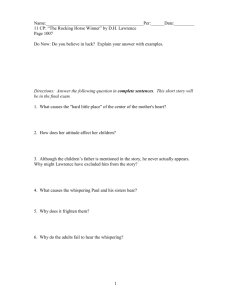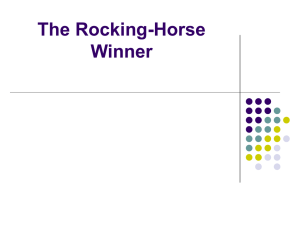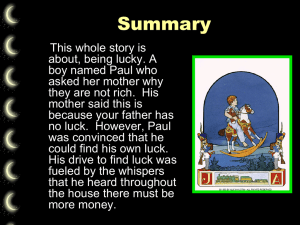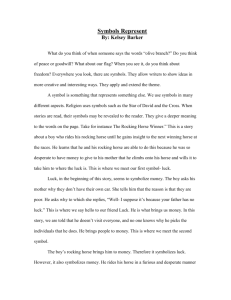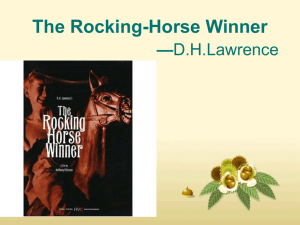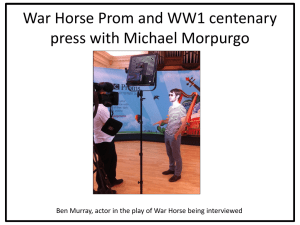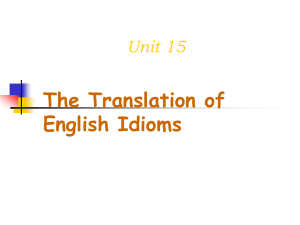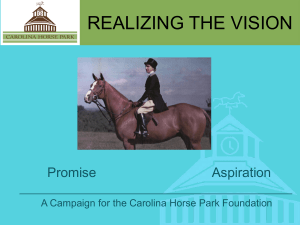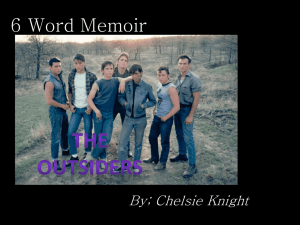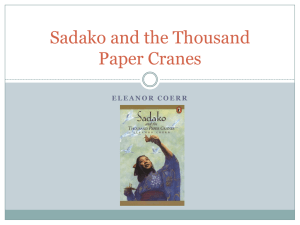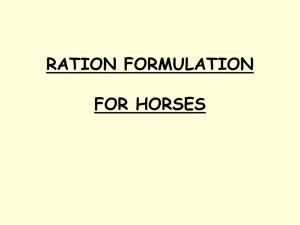Rocking Horse
advertisement
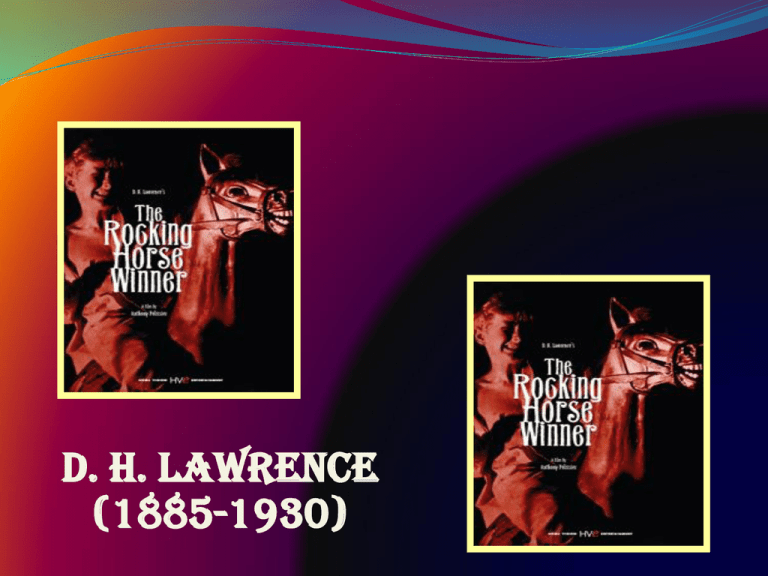
D. H. Lawrence (1885-1930) D. H. Lawrence English novelist, short story writer, critic, poet, and painter Son of a heavy- drinking coal miner Childhood was dominated by poverty and friction between his parents Lady Chatterley's Lover (1928) tells of the love affair between a wealthy, married woman, and a man who works on her husband's estate. The book was banned for a time in both UK and the US as pornographic Sons and Lovers (1911) autobiographical novel detailing the difficulties of his childhood Kangaroo(1923) is strongly autobiographical, reflecting the almost daily flow of Lawrence's thoughts and impressions while in Australia The Plumed Serpent (1926) was a vivid evocation of Mexico and its ancient Aztec religion. The Man Who Died (1929) is a bold story of Christ's Resurrection. The End Rocking horse winner characters Paul: the main character in the story. He believes that he is a lucky person and with the gift when riding his rocking horse, he can know the winner of horse races. In order to prove her mother that he can find luck ;however, he does not realize there would be a terrible price to pay. Hester: Paul’s mother. She is kind of material woman and does not feel content what she has. She thinks herself having no luck, because her husband is an unlucky person. characters The father: Paul’s father. A middle-aged dejection man - has no luck. Oscar Cresswell: Paul’s uncle. When noticing that Paul is very lucky at choosing whom the winner would be, he approaches Paul about his lucky. After, he becomes a partner with Paul. Bassett: He is a gardener and a partner with Paul. Narrative perspective 3rd person omniscient .......D. H. Lawrence wrote the story in omniscient third-person point of view, enabling him to reveal the thoughts of the characters. Paul's mother only made several hundreds, and she was again dissatisfied. She so wanted to be first in something, and she did not succeed, even in making sketches for drapery advertisements. His mother had sudden strange seizures of uneasiness about him. Sometimes, for half an hour, she would feel a sudden anxiety about him that was almost anguish. She wanted to rush to him at once, and know he was safe. She had bonny children, yet she felt they had been thrust upon her, and she could not love them. They looked at her coldly, as if they were finding fault with her. And hurriedly she felt she must cover up some fault in herself. Themes Neglect .......In her preoccupation with material things, Hester neglects to provide Paul the love he needs to develop into a normal, mentally stable child. Faulty Sense of Values .......Hester makes stylish living the chief goal of her marriage. Consequently, her relationship with her husband and the care and nurture of her children—in particular, Paul—stagnate. Whenever money becomes available, she spends beyond her means. Though she and her husband rear their children in a "pleasant house" with servants and a nurse, they seem to regard them as objects for display, like the furnishings in the home. Hester's spending and indebtedness create anxiety that haunts the house and personifies itself by repeatedly whispering the phrase: "There must be more money.“ Themes Obsession .......Lust for material objects, stylish living, and money so obsesses Paul's mother that she neglects Paul and his sisters. Paul then "inherits" her obsession. But he wants to win money for his mother, not for himself, in order to prove that he has the luck that his father lacks. Having luck and money will make him lovable to his mother, he apparently believes, and silence the house voices. When he discovers that the five thousand pounds he sets aside for her is not enough to achieve his goals, he becomes obsessed with winning more. His mania ultimately kills him. Themes Opportunism .......Oscar Creswell acknowledges that Paul's wagering makes him nervous. But rather than take steps to stop Paul, he encourages him and asks for tips on winning horses. When Paul lies deathly ill muttering the name of his pick for the Derby, Oscar runs off "in spite of himself" and places a bet on the horse at fourteen to one odds. Quest .......Paul rides his rocking horse like a knight on a quest. He seeks a great prize, luck, that will enable him to win money wagering on horses. His winnings will free his mother from a great monster, indebtedness, that consumes all of her attention. Once free, she will be able to turn her attention to Paul and give him the greatest prize of all: love. Deceit .......In the first paragraph of the story, the narrator says Hester does not love her children. Nevertheless, outwardly she pretends to love them, and people say, "She is a good mother. She adores her children." Themes Materialism vs Unconditional familial love When financial wealth and security are placed above the open expression of unconditional love, a destructive and dysfunctional family dynamic is created. Destructive power of obsession Dedicating oneself obsessively to achieving a goal can create an unhealthy imbalance in the mind, emotions, and / or body. Money The house is haunted by the ghost of money, whispering repeatedly the terrible command, “There must be more money!” Money is the symbolic substitutes for love and affection. To Paul, money isn’t a good in itself—it is only a way to win his mother’s affection. “The boy saw him did not believe him… and made him want to compel her affection.” Paul is driven to his death by the inflexible money mindedness of his parents. The Love of money somehow interferes with the life process. Capitalism Capitalist: Paul, as a handicapper, he invests money, betting on a profitable return on his investment, and In this sense, he is a capitalist. Indeed, his betting is the sign of the economic relations controlling the world of the story. But at the same time, for what he is investing, in real terms is himself, selling his skills to generate wealth that he is not free to possess. Laborer: Young Paul exemplified vividly the sort of work that arises under capitalism Simply put, he is a laborer of his mother. Exploitation: Exploitation is the necessary element under the capitalistic society. “The essential meaning of exploitation is that a surplus is seized from the working population for the benefit of a superior class. Paul is exploited by the capitalistic society and the economic pressure that is passed down by his mother. Alienation: In capitalistic and money- dominated society, people are aloof and isolated from one another. Alienation is one of the components of Capitalism. Paul is isolated from his parents, his sisters and even the world. Religion The presence of Christianity in the story is set forth most readily, of course, in the depiction of the young Paul as a Christ figure: not only is he referred to repeatedly as “son”, but he also possesses a seemingly magical power that comes form heaven. The most telling example is Paul himself, who willingly sacrifices himself to save the world into which he was born. His death gives his family the financial independence possible, even while it appears holy and pure, is in fact devilish. Atmosphere/mood “And so the house came to be haunted by the unspoken phrase: There must be more money! There must be more money!” Repetition reinforces the impact of personification . Objects– the rocking horse, doll and puppy hear the secret whisper: “There must be more money~” metaphor The child had never been to a race-meeting before, and his eyes were blue fire.(Comparison of the eyes to fire) simile “Bassett was serious as a church.” And yet the voices in the house . . . simply trilled and screamed in a sort of ecstasy: "There must be more money! ” “His eyes blazed at her for one strange and senseless second, as he ceased urging his wooden horse.” “The voices in the house suddenly went mad, like a chorus of frogs on a spring evening.” (Comparison of the voices to frogs) “He neither slept nor regained consciousness, and his eyes were like blue stones.” (Comparison of the Paul's eyes to stones) Figurative language Filthy Lucre/Lucker Verbal irony—lucre (money) and luck are essentially the same thing in the mother’s and the boy’s minds. symbolism House Wealth Superiority Superficiality Empty of love like the mother Rocking Horse Fake Materialistic values Wooden dream Going nowhere Mother’s job sketching furs Like the rocking horse, this is a mockery of the reality she wishes for Eye imagery D. H. Lawrence's attention to the eyes helps to convey the inmost feelings of characters in some instances. (characterization) In fact a good deal of communication between human beings is nonverbal and glaring eyes, frowns, furrowed brows, and shrugs can sometimes communicate more meaning than words. It enhances the mysterious and sometimes unsettling atmosphere of the story by leaving open to question what a gaze or a stare means. (atmosphere/mood) Eye imagery examples “Only she herself, and her children themselves, knew it was not so. They read it in each other’s eyes.” “the boy watched her with unsure eyes.” “his eyes had a strange glare in them. The little girls dared not speak to him.” (establishing character) Referring to the RH “its big eye was wide and glassy-bright.” link to Paul and the horse “The boy gazed at his uncle from those big, hot, blue eyes, set rather close together. The uncle stirred and laughed uneasily. “ (establishing mood) “The boy watched him with big blue eyes, that had an uncanny cold fire in them, and he said never a word.” (notice the author hear lets allusion English novelist, short story writer, critic, poet, and painter Son of a heavy- drinking coal miner Most famous novel - Lady Chatterley's Lover (1928) alliteration “Now!” he would silently command the snorting steed.” foreshadowing Reference is made to the supernatural when Paul told his mother that he was a lucky person. “He stared at her. He didn’t even know hwy he had said it. “God told me,” he asserted…..He did mother!” “We’re all right when we’re sure,” said Paul. “It’s when we’re not quite sure that we go down.” In relation to the continued whispering of the house. It was said that “Paul could not bear up against it.” Paul has his rocking horse moved to his own bedroom. His irony Tragic Irony: .......Paul picks the winning horse in the Epsom Derby but loses his life. The fortune he had amassed, eighty thousand pounds (the equivalent of millions of dollars today), thus became his misfortune. oxymoron It was a soundless noise, yet rushing and powerful. Cause/effect No luck: “It’s because your father has no luck,” said Paul’s mother when asked why they were poor. Family Relationship Husband Wife The relationship between husband and wife is obviously cold and boring. They married for love, but when the passion of love passed away, their postnuptial life become tedious. Besides, the husband doesn’t have a good social position and miss the promotion in his job. Therefore, the wife begins to complain about the husband’s unlucky and pursues material needs. However, they still keep the superficial harmony of the family. “There was a woman who was beautiful, who started with all the advantages, yet she had no luck. She married for love but the love had turned to dust.” “Although they lived in style, they felt always an anxiety in the house. There was never enough money. The mother had a small income, and the father had a small income, but not nearly enough for the social position which they had to keep up. The father went into town to some office. But though he had good prospects, these prospects never materialized. There was always the grinding sense of the shortage of money, though the style was always kept up. ” Family Relationship Parents Children The relationship between parents and children is quite indifferent. The parents are too busy in keeping their fame, profits, and social position to take care of their children. Nevertheless, children, especially at the age of Paul, need the love and care from parents. Thus, Paul, in order to attract his mother’s attention and piece together the whole family, gambles the horse-racing and gives the money reward to his mother. However, his mother is not satisfied with the money, she wants more and more and finally causes the death of Paul. Family Relationship (Oedipus Complex) Paul Romance -- Reality (Rockinghorse) (Love) Mother Materialism (Marriage) (Money, Social position.) Luck Father Family and Society Family = Society Mother = Materialism Paul = sacrifice = civilized men = spiritual life Whispering = Desire
